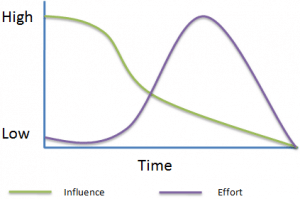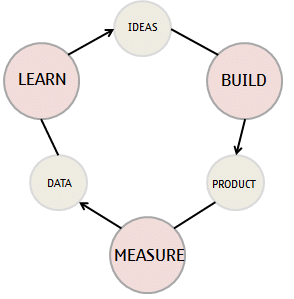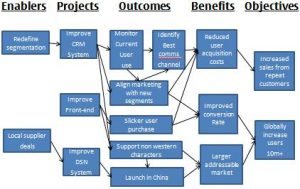To be successful in any complex endeavour a plan is needed. Once the plan is created you then need to adapt and be flexible as obstacles are thrown in your way. If people are passionate about reaching the goal, and with the current trend towards Agile development, it can be tempting to jump into the deep end and begin work without a plan. This is usually the wrong thing to do as the following example will highlight.
The example I’m going to use is a group game called The Negotiation Auction Game. This game is great for highlighting to new and aspiring project managers the importance of having a plan. It works like this. We auction $10 to the group. Bids start at $1 and can only go up in 50 cent increments. The catch is that both the highest bidder and the second highest bidder have to pay their highest bids respectively, but only the highest bidder gets their hands on the $10. When running this game, if you want to end the auction, simply keep giving the players 5 more seconds to bid or the auction ends.
When you play this game, 9 times out of 10 it will proceed as follows. A few players will see the initial opportunity of winning the $10 for a small initial outlay and place some low bids. Bidding will quickly ratchet up to the $5 mark. Beyond this point you will generally find just a couple of bidders remain and they will continue to up the bids. However, at some point their motive changes from aiming to win $10, to one of trying not to lose, trying to save face. Remarkably, it’s not uncommon for the bidding to go above $10 as one player hopes it will cause the other player to back down and that they will suffer only minimal losses.
Once you’ve played the game it can be useful to dissect what happened with your team, and what can be learned from it. The players will typically share how their motive changed from wanting to win the $10 to not wanting to lose, and how certain players kept bidding in an attempt to save face in front of their colleagues.
When the team examines what they could have done differently there will be two obvious lessons.
- Perhaps some basic scenario planning could have helped individuals to understand when to stop bidding.
- Perhaps the two highest bidders could have communicated with each other during the auction, and agreed to stop bidding and thus sharing the $10, limiting both their losses.
Even though this game was originally designed for students learning negotiation, it very quickly shows the team the need for a plan and flexibility when trying to achieve even seemingly simple objectives.
Now that we have used this simple example to show the importance of a plan, let’s look at some of the different approaches covered elsewhere on this site, that you can use for planning and to ensure your plan is flexible:
Fast track Planning
This is a good technique for creating a full project plan in under one day, even for complex projects. I’ve used this technique several times when asked to rescue projects which have been failing to get off to a good start. It can be used in conjunction with any of the approaches below.
Top Down Guidance
This approach places a stake in the ground around which planning can happen. It is useful when there is ambiguity around the best way to achieve the objectives of the project, because by placing a stake in the ground it forces the team to make decisions to hit dates. This technique focuses the team on what is important to achieve and what is not.
Planning and Risk
This approach aims to stack the odds of having a successful project in your favour by structuring the project in such a way that it can be successful, even if your scope creeps or your budget is cut by 40%, for example.
Scenario Planning
Work Breakdown Structure
Every project needs to know exactly what it’s trying to deliver, and this is the tool which can help you to define exactly what you’re tasked with delivering.
Summary
This article uses a simple group game called the Negotiation Auction Game to demonstrate the importance of having a plan, for every project, regardless of size. It then goes on to provide a selection of tools and techniques you can use to both create your plan, and also to make your plan flexible. Please comment below if you’re currently using these techniques or there are other techniques which you’re finding invaluable. And if you do try out the game above, remember to donate wins and losses to charity.






